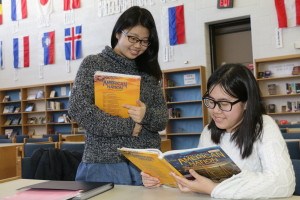By Susan Bromley

Staff Writer
Brigitte Todd is providing a home for two foreign exchange students this year, Honoka Kanno and Giang Le, who hail from Japan and Vietnam, respectively, and very much liking their company.
“I enjoy hosting exchange students as they open my eyes to new and exciting things,” said Todd. “It’s fascinating to see what they think is interesting about American life. I love learning about things about their countries and lifestyles. It is fascinating to compare and contrast the differences between the countries. It also gives my kids ‘siblings’ to interact with.”
Todd has homeschooled her own children and her biggest challenge in hosting exchange students has been getting used to a schedule in which she gets up early to see them off to classes at Brandon High School.
Honoka and Giang, who goes by “Tina,” have adjusted well to life in America despite the many differences from their own countries, especially at school. In each of their home countries, they take more than a dozen classes (double that of which they take at BHS) which are all in required subjects, just at different levels, in areas of math, science, language, and social studies.
“The education system is not very good in Vietnam,” said Tina, 16.
“We have a lot to learn, but can’t apply it to real life. Everyone has 14 subjects to learn… I have to learn technology and we have to learn architecture even though we don’t like it. I want to be a food scientist. I like statistics and microbiology.”
The sophomore’s parents own two houses in Ho Chi Minh City, as well as their own gold business. She has a 4-year-old sister. Tina has been an exchange student in California and Hawaii as well as Canada, although the experiences when she was 13 and 14 were only for a month each. She plans to remain here for next school year, attending Our Lady of the Lakes in Waterford, which means she won’t see her parents for two years, but it doesn’t faze the independent teen, who calls home once a week.
This is the first exchange for Honoka and the adjustment has been tougher. The Tokyo native is the daughter of an engineer and a part-time kindergarten teacher and has two younger siblings. She applied for an exchange program scholarship from the Japanese government two years ago from a desire to change herself.
“I couldn’t do anything without my Mom,” said Honoka. “I wasn’t having a good relationship with my Mom, I didn’t want to hear her. I thought she hated me, but it was her love for me. Now I see she was trying to help me. After I came here, I realized my family is important to me.”
One of the biggest differences Honoka has noticed between Japan and the U.S. is transportation. In Tokyo, she doesn’t have to ask for anyone to take her somewhere, she simply says goodbye to her family, walks out the front door of their apartment and can walk or ride a bus or train to whereever she wants to go. Here, she has to ask her host family to drive her.
Both she and Tina say Americans appear more outgoing than those from their Asian cultures, which they describe as more reserved. Honoka said Japanese are shy at first, only becoming more talkative as they get to know people better. Tina said the Vietnamese aren’t shy, but don’t socialize as much as Americans, nor do they talk to strangers.
“Here in America, everyone talks to strangers,” said Tina. “I love how Americans act like that.”
She also loves how Americans volunteer more, the streets are cleaner in the U.S. than in Vietnam, and American vote more, which she attributes to a 2-party political system, as opposed to Vietnam’s one-party system. The Vietnamese, she said, have watched American politics with interest, were happy when former President Barack Obama visited, and have reservations about the new president.
“People are worried about Trump and his immigration laws and rules,” said Tina, who wants to move here in five years and said her parents are waiting for their immigration papers for the better living conditions in the U.S. In Vietnam, she said healthcare is not good, even though it is cheap, and additionally, there is a lot of food poisoning from a lack of federal regulations, part of the reason she wants to be a food scientist.
“I want to produce more food for people around the world,” she said.
Todd has discovered that one of the benefits of hosting foreign exchange students is enjoying the food from their native countries.
Both Honoka and Tina have made meals for the Todd family, who have particularly liked Japanese cheesecake and Japanese curry, and the Todds have also tried their hands at cooking Asian cuisine, which the students have enjoyed judging on how similar or different they are to dishes at home.
This is the third time Todd has hosted exchange students, with previous students coming from Germany and Thailand.
“Overall we really enjoy the experience of having these young ladies sharing their lives with us and us sharing our lives with them,” said Todd. “Perhaps one day in our retirement we can go visit all our girls around the world.”
